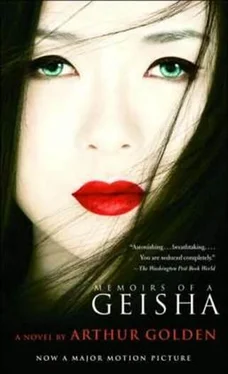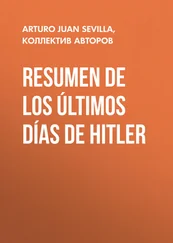I was so astonished that I stood a long while with my hand over my mouth, and I’m sure my eyes were as big around as teacups. The return address, beneath a patch of stamps, was from Mr. Tanaka. I had no idea what could possibly be in the package, but seeing Mr. Tanaka’s name there… you may find it absurd, but I honestly hoped perhaps he’d recognized his mistake in sending me to this terrible place, and had mailed me something to set me free from the okiya. I can’t imagine any package that might free a little girl from slavery; I had trouble imagining it even then. But I truly believed in my heart that somehow when that package was opened, my life would be changed forever.
Before I could figure out what to do next, Auntie came down the stairs and shooed me away from the box, even though it had my name on it. I would have liked to open it myself, but she called for a knife to cut the twine and then took her time unwrapping the coarse paper. Underneath was a layer of canvas sacking stitched up with heavy fishermen’s thread. Sewn to the sacking by its corners was an envelope bearing my name. Auntie cut the envelope free and then tore away the sacking to reveal a dark wooden box. I began to get excited about what I might find inside, but when Auntie took off the lid, I felt myself all at once growing heavy. For there, nestled amid folds of white linen, lay the tiny mortuary tablets that had once stood before the altar in our tipsy house. Two of them, which I had never seen before, looked newer than the others and bore unfamiliar Buddhist names, written with characters I couldn’t understand. I was afraid even to wonder why Mr. Tanaka had sent them.
For the moment, Auntie left the box there on the floor, with the tablets lined up so neatly inside, and took the letter from the envelope to read it. I stood for what seemed a long while, full of my fears, and not daring even to think. Finally, Auntie sighed heavily and led me by the arm into the reception room. My hands were trembling in my lap as I knelt at the table, probably from the force of trying to keep all my terrible thoughts from rising to the surface of my mind. Perhaps it was really a hopeful sign that Mr. Tanaka had sent me the mortuary tablets. Wasn’t it possible that my family would be moving to Kyoto, that we would buy a new altar together and set up the tablets before it? Or perhaps Satsu had asked that they be sent to me because she was on her way back. And then Auntie interrupted my thoughts.
“Chiyo, I’m going to read you something from a man named Tanaka Ichiro,” she said in a voice that was strangely heavy and slow. I don’t think I breathed at all while she spread the paper out on the table.
Dear Chiyo:
Two seasons have passed since you left Yoroido, and soon the trees will give birth to a new generation of blossoms. Flowers that grow where old ones have withered serve to remind us that death will one day come to us all.
As one who was once an orphaned child himself, this humble person is sorry to have to inform you of the terrible burden you must bear. Six weeks after you left for your new life in Kyoto, the suffering of your honored mother came to its end, and only a few weeks afterward your honored father departed this world as well. This humble person is deeply sorry for your loss and hopes you will rest assured that the remains of both your honored parents are enshrined in the village cemetery. Services were conducted for them at the Hoko-ji Temple in Senzuru, and in addition the women in Yoroido have chanted sutras. This humble person feels confident that both your honored parents have found their places in paradise.
The training of an apprentice geisha is an arduous path. However, this humble person is filled with admiration for those who are able to recast their suffering and become great artists. Some years ago while visiting Gion, it was my honor to view the spring dances and attend a party afterward at a teahouse, and the experience has left the deepest impression. It gives me some measure of satisfaction to know that a safe place in this world has been found for you, Chiyo, and that you will not be forced to suffer through years of uncertainty. This humble person has been alive long enough to see two generations of children grow up, and knows how rare it is for ordinary birds to give birth to a swan. The swan who goes on living in its parents’ tree will die; this is why those who are beautiful and talented bear the burden of finding their own way in the world.
Your sister, Satsu, came through Yoroido late this past fall, but ran away again at once with the son of Mr. Sugi. Mr. Sugi fervently hopes to see his beloved son again in this lifetime, and asks therefore that you please notify him immediately if you receive word from your sister.
Most sincerely yours,
Tanaka Ichiro
Long before Auntie had finished reading this letter, the tears had begun to flow out of me just like water from a pot that boils over. For it would have been bad enough to learn that my mother had died, or that my father had died. But to learn in a single moment that both my mother and my father had died and left me, and that my sister too was lost to me forever… at once my mind felt like a broken vase that would not stand. I was lost even within the room around me.
You must think me very naive for having kept alive the hope for so many months that my mother might still be living. But really I had so few things to hope for, I suppose I would have clutched at anything. Auntie was very kind to me while I tried to find my bearings. Again and again she said to me, “Bear up, Chiyo, bear up. There’s nothing more any of us can do in this world.”
When I was finally able to speak, I asked Auntie if she would set up the tablets someplace where I wouldn’t see them, and pray on my behalf-for it would give me too much pain to do it. But she refused, and told me I should be ashamed even to consider turning my back on my own ancestors. She helped me set the tablets up on a shelf near the base of the stairwell, where I could pray before them every morning. “Never forget them, Chiyo-chan,” she said. “They’re all that’s left of your childhood.”

Around the time of my sixty-fifth birthday, a friend sent me an article she’d found somewhere, called “The Twenty Greatest Geisha of Gion’s Past.” Or maybe it was the thirty greatest geisha, I don’t remember. But there I was on the list with a little paragraph telling some things about me, including that I’d been born in Kyoto-which of course I wasn’t. I can assure you I wasn’t one of Gion’s twenty greatest geisha either; some people have difficulty telling the difference between something great and something they’ve simply heard of. In any case, I would have been lucky to end up as nothing more than a bad geisha and an unhappy one, like so many other poor girls, if Mr. Tanaka had never written to tell me that my parents had died and that I would probably never see my sister again.
I’m sure you’ll recall my saying that the afternoon when I first met Mr. Tanaka was the very best afternoon of my life, and also the very worst. Probably I don’t need to explain why it was the worst; but you may be wondering how I could possibly imagine that anything good ever came of it. It’s true that up until this time in my life Mr. Tanaka had brought me nothing but suffering; but he also changed my horizons forever. We lead our lives like water flowing down a hill, going more or less in one direction until we splash into something that forces us to find a new course. If I’d never met Mr. Tanaka, my life would have been a simple stream flowing from our tipsy house to the ocean. Mr. Tanaka changed all that when he sent me out into the world. But being sent out into the world isn’t necessarily the same as leaving your home behind you. I’d been in Gion more than six months by the time I received Mr. Tanaka’s letter; and yet during that time, I’d never for a moment given up the belief that I would one day find a better life elsewhere, with at least part of the family I’d always known. I was living only half in Gion; the other half of me lived in my dreams of going home. This is why dreams can be such dangerous things: they smolder on like a fire does, and sometimes consume us completely.
Читать дальше













